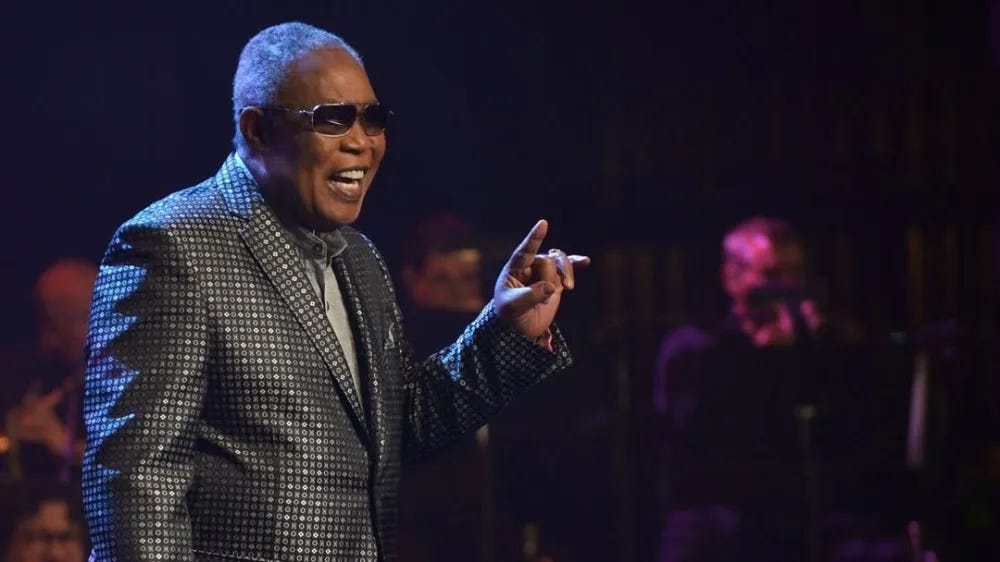Last of the Soul Men
Remembering Sam Moore, half of one of the most dynamic duos of all time, and a powerful force on his own.
In the introduction to Have A Little Faith: The John Hiatt Story, I talked briefly about Sam & Dave.
My dad was a die-hard soul fan. I grew up marveling at the jackets of his Atlantic soul compilations: Joe Tex, Solomon Burke, Wilson Pickett, Don Covay—titans of soul. It was raw. They would scream, shout, croon; Sam Moore of Sam & Dave would have tiny bouts of involuntary laugh spasms in the middle of a line. Even when these artists were pouring their hearts out on a soul-wrenching ballad, they sounded like they were having the time of their lives.
Sam & Dave were one of those cornerstone acts for me. They were electrifying, powerful, loud, celebratory, soulful. Fueled by the songwriting of Isaac Hayes and David Porter, backed by Booker T & the MGs and the Memphis Horns, Sam & Dave’s uptempo numbers, “Soul Man,” “I Thank You,” and “Hold On, I’m Comin’” brought you along, sharing in their joy. Then, on “When Something Is Wrong With My Baby,” you could feel the empathy, the affirmation of love, while with “Soothe Me,” the lure of seduction was undeniable. That’s the power of soul.
I was lucky that I didn’t need the likes of Bruce Springsteen to guide me toward these musical heroes. I found them through my parents’ 45s and Atlantic comps before I ever heard of the Boss. But when I did hear how he championed the giants of soul and early rock’n’roll, it was an assurance that I was on the right track, following him and his E Street crew into their own interpretation of this powerful music.
After he split from David Prater in 1970, Sam carried on as an ambassador of rhythm and blues for decades. There were dark times, too, including addiction and having to wrestle with his former partner hiring another Sam (Daniels) to perform for at-times unwitting fans. By the mid-80s, however, Moore was seen rightfully as an originator and a go-to duet partner; whenever a rock or country star needed to inject a little soul cred into their songs, like Don Henley did on a standout track from 1984’s Building the Perfect Beast.
Some of these collabs worked, some were just…well…
His connection with the Blues Brothers began with their use of “Soul Man” during their performances on Saturday Night Live in the late ‘70s and in their 1980 movie. He joined the cast in the 1998 sequel, The Blues Brothers 2000, performing “John the Revelator.”
He released Overnight Sensational, a solo album packed with guest stars, as was the norm, in 2006. But for my money, hearing him duet with fellow longtime journeyman, Conway Twitty, on Tony Joe White’s “Rainy Night in Georgia” from the Rhythm, Country & Blues various artists project in 1994, was a late career highlight. It was Conway’s last recording to hit the airwaves and at the end, you hear Sam calling out to Conway, as if trying to lure him back from the great beyond. Now, it sounds like Sam’s telling him to hold on, he’s finally comin’ to join him.
For more on Sam’s remarkable career, be sure to check out these wonderful rememberances…
The Variety obit by Chris Morris
The New York Times obit by Bill Morris
The Rolling Stone obit by David Browne
But most importantly, listen to the music…



Reading this caused me to travel down the usual mental rabbit hole, thinking of seeing their shows advertised at The Embers Club in Raleigh and also at The Embers Beach Club in Atlantic Beach. Never saw them in Raleigh but the venue in AB had a deck on the ocean side with large windows. If you were cool (and the bouncer was your older sister's boyfriend) you could stand on the deck and watch the band despite being underage. Saw quite a few "beach music" and "soul music" groups that way.
The crossover between "beach music" and "soul music" in NC/SC would make an interesting book. Bobby Tomlinsom of The Embers group says he started hearing the term "beach music" sometime between '65 and '68 but can't quite pin down when he heard "soul music" for the first time. At any rate, bands like James Brown and the Famous Flames played his clubs and it would be a real stretch to think of JB as beach music.
While the Embers clubs were proving that you could make money this way, they helped spawn (to my mind) places like The Experience in Raleigh and The Raft in AB, followed by The Music Factory in Greenville which somehow managed to attract shows like Johnny Winter and Steppenwolf to play in a small club in the middle of nowhere.
Growing up in southern Ontario, the car radio was always tuned to Detroit AM radio. So much soul we would belt out singing along. Aretha, The Supremes, Sam & Dave, Smokey Robinson and on and on. And the radio commercials … “Sunday, from Detroit dragway see Big Daddy …!”
If you had a garage or high school band you had better do some soul covers. Great article!